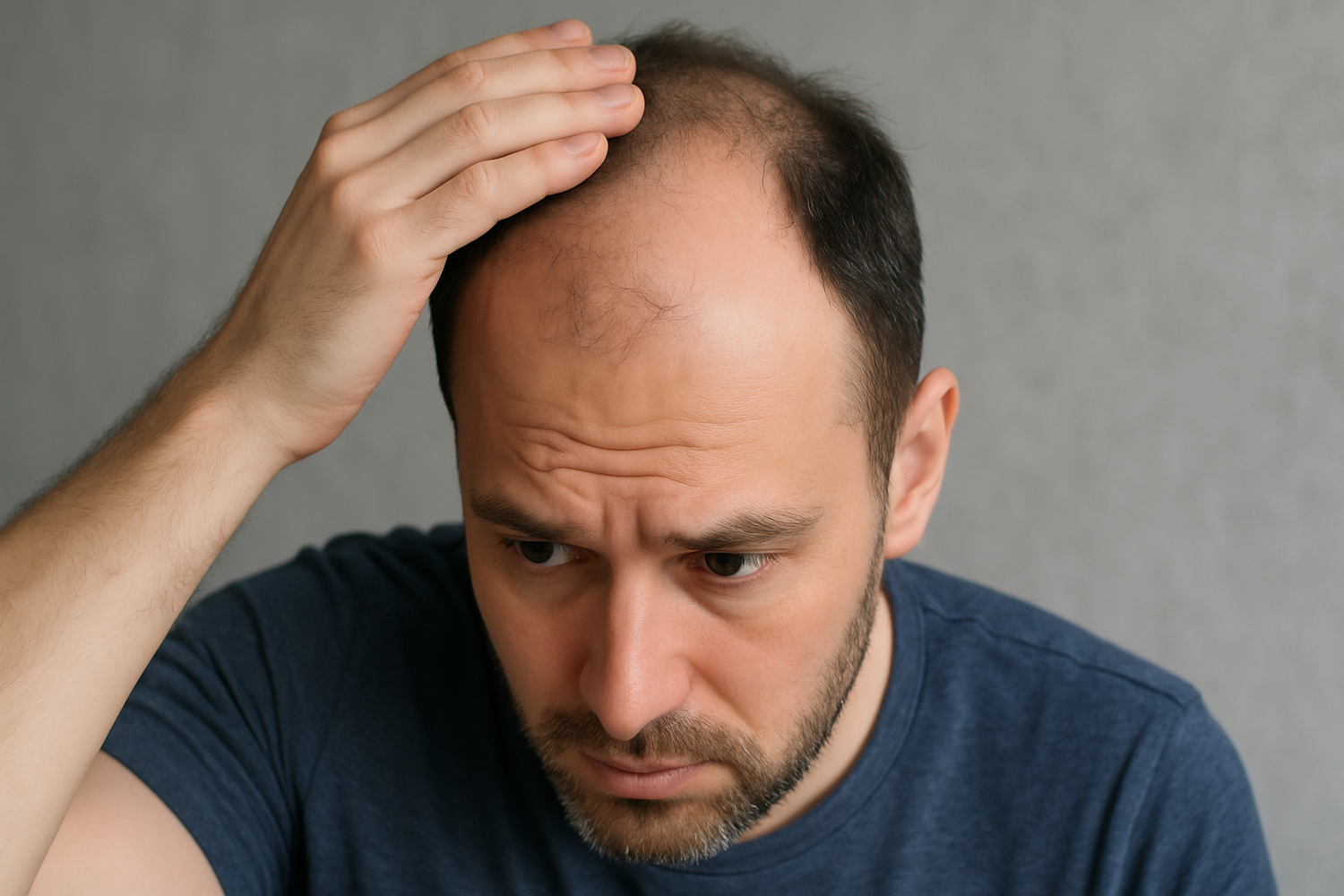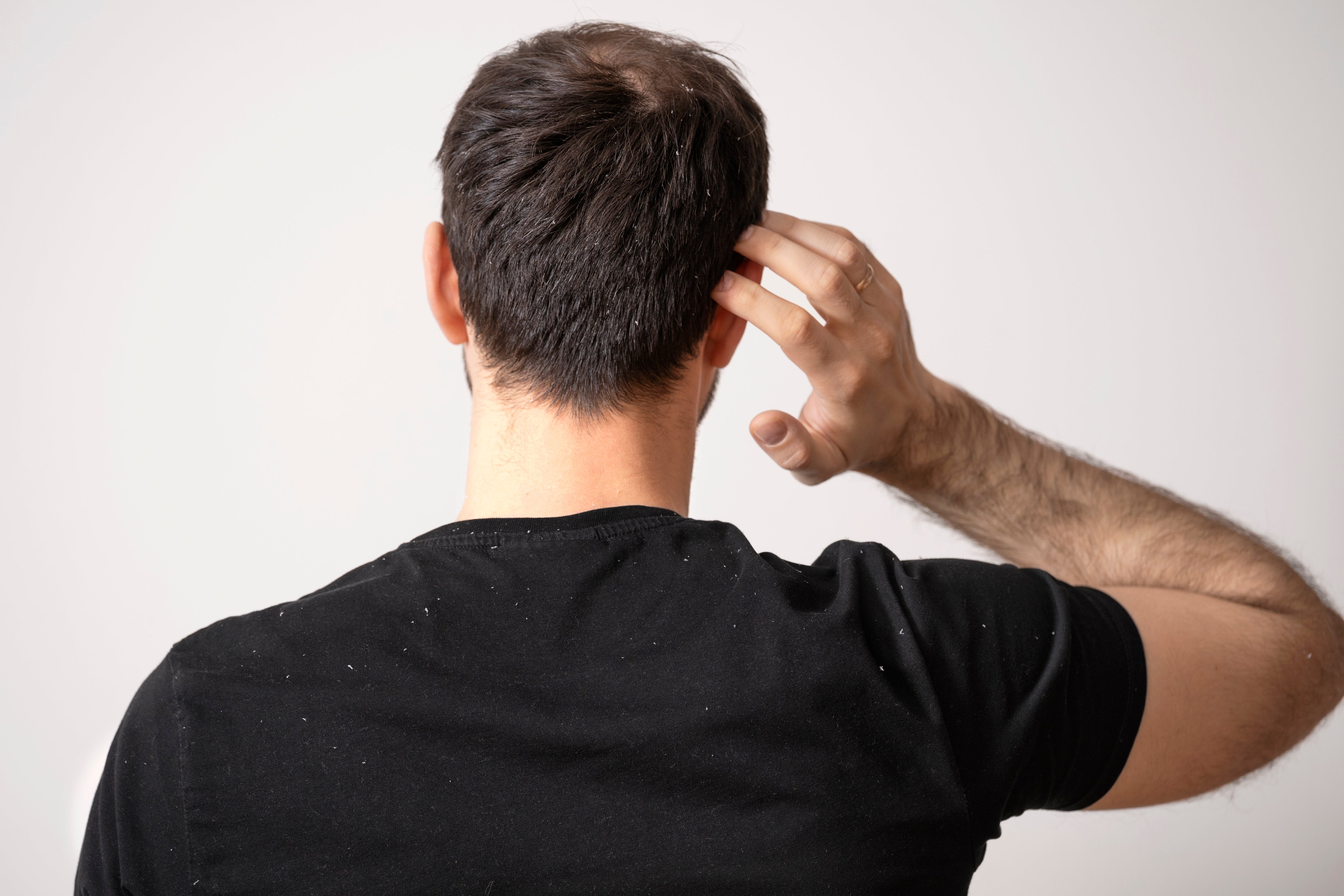The average person sheds around 50 to 100 hairs each day. For most, this is part of the normal hair growth cycle. But when hair starts thinning visibly, it's time to question what might be causing it. One of the most common causes is alcohol.
There's a debate over whether drinking can lead to hair loss. Some people point to alcohol as a direct cause, while others say it has no impact.
Occasional drinking doesn't affect your hair; however, regular or heavy alcohol use can cause internal imbalances in your body.
Alcohol causes your body to lose key nutrients, as well as causing a shift in your hormone levels, particularly testosterone and cortisol. Liver function can also decline, allowing toxins to build up. These changes don't directly affect your hair, but they can slow or disrupt its growth.
This blog explores: "Does alcohol cause hair loss?" We'll also look into how alcohol indirectly affects hair health through nutrient loss, hormone changes, and liver function.
How Alcohol Affects Your Body and Your Hair
Alcohol affects more than just your mood or your liver. It has a direct impact on your overall body, including the way your hair grows.
Alcohol and Nutrient Absorption
One way alcohol affects hair is by interfering with the absorption of nutrients. Iron, zinc, biotin, and protein are essential for healthy hair growth. When you drink frequently, alcohol can hinder your body's ability to absorb these nutrients. As a result, your hair might become weaker and more prone to falling out. Nutrient depletion also compromises the strength of hair follicles. This makes it difficult for your hair to grow at its usual rate.
Dehydration and Dry Scalp
Alcohol has a dehydrating effect on the body, as it acts as a diuretic. This means it increases urination, leading to a loss of water and essential minerals. When your body is dehydrated, your scalp suffers as well. A dry scalp can lead to dandruff, itchiness, and hair that is more prone to breakage. The natural moisture balance of hair is disrupted without proper hydration, causing brittle and dull strands.
Hormonal Disruption
Chronic alcohol consumption can cause imbalances in your hormone levels, which significantly affect hair growth. Alcohol can increase cortisol and lower testosterone. High cortisol levels interrupt the normal hair growth cycle, causing excessive hair shedding. This hormonal imbalance can worsen conditions like male pattern baldness in men.
Liver Stress and Hair Growth
Your liver detoxifies the body and regulates hormones. When alcohol puts strain on the liver, its ability to perform regular tasks declines. The liver becomes less effective at filtering toxins, which can build up in the bloodstream and negatively affect hair growth. Furthermore, an unhealthy liver can cause hormonal imbalances, further disrupting the hair growth cycle and its related repercussions.
Can Alcohol Alone Cause Hair Loss?
Alcohol often gets blamed for many health issues, but the idea that it causes hair loss on its own is misleading. Most dermatologists agree that alcohol doesn't directly lead to baldness. However, it can create conditions in the body that speed up hair thinning, especially when combined with other factors.
One of the common contributors to hair loss in men is genetics. Male pattern baldness, also called androgenetic alopecia, is often passed down through family lines. In this condition, hair follicles become sensitive to a hormone called DHT, which gradually shrinks them. While alcohol doesn't cause this sensitivity, it may worsen the effects. Heavy drinking can throw off hormone levels and increase stress, both of which may speed up the process.
There's also a difference between occasional drinking and long-term alcohol abuse. A glass of beer or wine twice a week is unlikely to have any noticeable impact on hair. But regular, heavy drinking can lead to nutrient loss, dehydration, and poor liver function, which ultimately affect the hair growth cycle.
Dr. Robert Dorin, a hair specialist, explains, "Alcohol can negatively affect our hair in multiple ways." He notes that excessive alcohol can dehydrate the body, leading to dry and brittle hair. Additionally, it affects the levels of nutrients important for strong and healthy hair.
Medical Conditions Linked to Alcohol That Can Cause Hair Loss
Chronic alcohol use doesn't just affect your liver or sleep. It can quietly impact your hair through a range of health conditions. These conditions often develop gradually but interfere with the systems supporting hair growth.Liver disease is one of the most common complications of long-term drinking. A damaged liver struggles to process nutrients. When the body fails to absorb vitamins and minerals, hair becomes weaker and more prone to falling out. Nutrients like iron, protein, zinc, and biotin are all important for healthy hair structure.
Hormonal shifts are another side effect. Alcohol can disrupt testosterone balance. In men, this imbalance may trigger increased levels of DHT (dihydrotestosterone), a hormone linked to male pattern baldness. Over time, this can accelerate thinning in genetically prone individuals.
The thyroid gland also feels the effects. Alcohol may interfere with thyroid hormones, which regulate metabolism and hair follicle activity. When the thyroid slows down, hair growth often does too.
Nutritional gaps are common in heavy drinkers. Deficiencies in folic acid, vitamin D, and protein can weaken hair from the root. Without these, strands may become brittle or stop growing.
Poor sleep and high stress often follow alcohol overuse. Both raise cortisol levels, which have been linked to hair shedding. Interrupted sleep also limits the body's natural repair processes.
Scientific Studies on Alcohol and Hair Loss
Several studies have explored how chronic alcohol use can affect hair health. While alcohol may not directly cause baldness, researchers have identified links between long-term drinking and the factors that influence hair growth and retention.
A study published in Nutrients examined the impact of alcohol on nutrient levels. It states that heavy drinkers often lack vital nutrients like zinc, iron, biotin, and folate. These nutrients play key roles in supporting hair structure and growth. Hair may thin, weaken, or fall out more easily without them.
Liver health has also been a focus of research. A study in StatPearls Publishing suggested that chronic alcohol use impairs liver function, which then affects detoxification and nutrient absorption. A sluggish liver can cause toxin buildup in the bloodstream, potentially disrupting the hair growth cycle.
While more targeted studies on alcohol and hair are needed, current evidence supports the connection between heavy drinking and the indirect causes of hair loss. These findings align with what many dermatologists observe in clinical settings; patients who consume alcohol regularly may experience more noticeable hair thinning or slower regrowth.
How to Prevent Hair Loss If You Drink Alcohol
If you choose to drink alcohol, do so in moderation. The CDC recommends that men limit their consumption to no more than two drinks per day. Drinking excessively can lead to nutrient depletion, hormonal imbalances, and dehydration, all of which can negatively impact hair growth.
Additionally, stay hydrated as alcohol can deplete your body of water, including moisture in your scalp. A dry scalp is less conducive to healthy hair growth. Drinking plenty of water is important to maintain proper moisture levels and reduce hair brittleness.
A balanced diet supports the foundation your hair needs to grow well. Foods like leafy greens, eggs, fish, and nuts are rich in biotin, protein, zinc, and omega-3 fatty acids, all of which support hair structure and overall growth. If your diet doesn't have these essential nutrients, take supplements like biotin, vitamin D, and Saw Palmetto to bridge the gap.
Furthermore, topical treatments can support your efforts from the outside. Minoxidil and DHT blockers are widely used. Spartan's complete hair care line offers a more targeted approach:
- SPARTAN™ - Root Activator Shampoo
- SPARTAN™ - Root Activator Conditioner
- SPARTAN™ - Root Activator Spray
- SPARTAN™ - Premium Scalp Brush
These products work together to cleanse and gently deliver nutrients to the hair roots gently. The scalp brush stimulates blood flow, enhancing nutrient absorption by the hair follicles.
Finally, managing stress is a vital part of your overall routine. Alcohol can disrupt cortisol and testosterone levels, so incorporating regular exercise, quality sleep, and mental wellness practices can help restore hormonal balance.
When these strategies are combined, you can create an environment that supports healthy hair growth without eliminating every drink from your life.
When to Seek Professional Help
Hair naturally sheds daily, but when it starts falling out in clumps or you notice visible thinning, it's time to pay attention. Sudden or excessive hair loss may not be tied to alcohol alone. Other factors, such as autoimmune conditions, thyroid disorders, or nutritional deficiencies, could be involved. At that point, it's worth asking, "Can drinking cause hair loss," or is something else contributing?
A dermatologist or trichologist can help identify the root cause. These specialists examine your scalp, assess your lifestyle, and may order blood tests to further evaluate your condition. Their evaluation goes beyond just the surface to rule out issues that could be worsening hair loss.
In some cases, they may recommend hair restoration. These can include topical or oral medications like minoxidil and finasteride, PRP (platelet-rich plasma) therapy, or even hair transplants for advanced cases.
Conclusion
So, does drinking cause hair loss? While alcohol alone doesn't directly cause baldness, chronic drinking can cause hair thinning over time. Nutritional deficiencies, hormonal imbalances, and poor liver function are often the underlying causes. Occasional drinking in moderation is unlikely to cause problems. But when drinking becomes a regular habit, it can quietly impact your hair's strength and growth.
The good news is you can take steps to protect your hair. Stay hydrated, eat a balanced diet, and use the right hair care products for healthy hair. Spartan offers a range of hair loss solutions, including shampoos and conditioners, sprays, and scalp brushes, designed to support scalp health and promote stronger hair.
If your hair loss feels unusual or persistent, don't guess. Speak to a professional and find a plan that works for you. And if you're looking for hair products that support your efforts, Spartan is a great place to explore.



